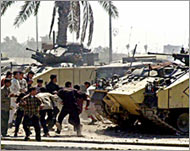Bush for NATO role in Iraq
US President George Bush has raised the possibility of a NATO role in trying to stabilise occupied Iraq.

Bush and his closest Iraq war ally, British Prime Minister Tony Blair, had breakfast talks on possible NATO involvement in training Iraqi security forces.
The news came as world leaders, including Iraq’s new interim president Ghazi al-Yawar, met at the Groups of Eight summit in Georgia on Wednesday.
Bush did, however, acknowledge that some members of the Western military alliance might not be able to contribute.
“We believe NATO ought to be involved,” Bush said, but added: “There’s going to be some constraints, obviously. A lot of NATO countries are not in a position to commit more troops.”
But nor do some countries want to send troops. France has always opposed the suggestion of sending NATO to Iraq, and Germany’s Gerhard Schroeder has said it would rather not commit troops as well.
Iraqi security
Blair emphasised that Iraqis need to be in a position to provide stability and security themselves.
|
“We believe NATO ought to be involved [in Iraq]… There’s going to be some constraints, obviously. A lot of NATO countries are not in a position to commit more troops” George Bush,US president |
“There is a capability that is there at the moment, but we know there are gaps in that capability and we are there to help them and make sure the Iraqis ultimately can take care of their own security and defence,” he said.
NATO Secretary General Jaap de Hoop Scheffer said earlier that it would be difficult for the alliance to turn a blind eye if the Iraqi interim government called for its intervention in the weeks or months to come.
Howver, Spanish Foreign Minister Miguel Angel Moratinos said NATO involvement in Iraq would be a mistake.
He added that even if NATO does become involved, Spain, a member of the alliance, would not send any of its troops back to Iraq “no matter under what umbrella”.
Spanish dissent
Spain last month completed the withdrawal of its 1400-strong military contingent, fulfilling a pledge by Socialist Prime Minister Jose Luis Rodriguez Zapatero, who won the general election 14 March.
The Iraq war led to bitter divisions between the United States and long-time allies like France and Germany.
And since the US-led invasion of Iraq last year, the country has been beset by car bombings and bloodshed.
But Bush is hoping the leaders will now focus on the future and help put an international stamp on Iraq.
Negotiators from the G8 countries – the United States, Britain, France, Germany, Italy, Japan, Canada and Russia – are working to complete the details of an initiative urging Arab and Muslim leaders in the Middle East and North Africa to adopt democratic reforms.
Middle East concerns
The leaders will discuss Bush’s Middle East initiative with their Middle Eastern counterparts at the summit.
 |
|
Iraq has been beset by violence |
The initiative has been the subject of meticulous negotiations for six months and the United States had to rewrite some of it to satisfy European concerns. One change that was made was to emphasise job creation.
Arab leaders are concerned the initiative will be seen as an attempt to impose Western-style reforms on them.
Officials are still working on the final text, and an agreement could be reached as early as Wednesday.
US officials said summit negotiators are also close to an agreement on a plan to stop the spread of nuclear weapons.
The proposal would, among other things, suspend for one year all new transfers of equipment for uranium enrichment and reprocessing.